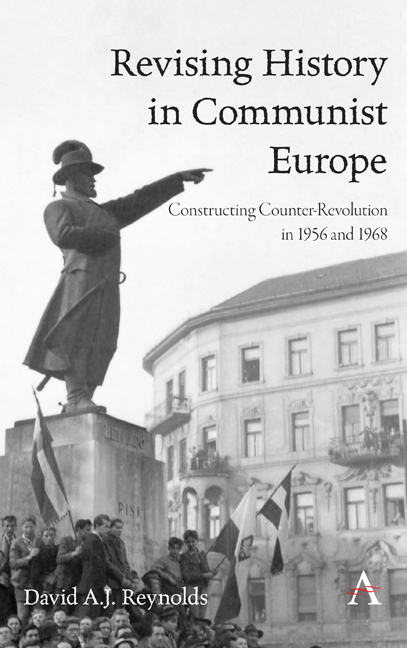Book contents
- Frontmatter
- Dedication
- Epigraph
- Contents
- Acknowledgements
- Introduction
- 1 The Export and Imposition of Stalinism
- 2 Hungarian De-Stalinization and Revising Recent History
- 3 A Revolution, a Counter-Revolution, or a National Uprising?
- 4 Stalinist Purges and De-Stalinization in Czechoslovakia
- 5 The Meaning of 1956 in 1968: March to June
- 6 June: Turning Point and the Hardening of Positions
- 7 July and August: Constructing Counter-Revolution
- 8 The Intentions of Intervention and the Shadow of 1956: Delusion and Failure
- Conclusion
- Epilogue
- Appendix
- Bibliography
- Index
2 - Hungarian De-Stalinization and Revising Recent History
Published online by Cambridge University Press: 16 February 2020
- Frontmatter
- Dedication
- Epigraph
- Contents
- Acknowledgements
- Introduction
- 1 The Export and Imposition of Stalinism
- 2 Hungarian De-Stalinization and Revising Recent History
- 3 A Revolution, a Counter-Revolution, or a National Uprising?
- 4 Stalinist Purges and De-Stalinization in Czechoslovakia
- 5 The Meaning of 1956 in 1968: March to June
- 6 June: Turning Point and the Hardening of Positions
- 7 July and August: Constructing Counter-Revolution
- 8 The Intentions of Intervention and the Shadow of 1956: Delusion and Failure
- Conclusion
- Epilogue
- Appendix
- Bibliography
- Index
Summary
The de-Stalinization and revision of recent history that took place in Hungary after Stalin's March 1953 death was not a cathartic experience in which suppressed realities were suddenly acknowledged. Instead, despite Hungary's subsequent reputation for rapid de-Stalinization, it was still a slow, tentative, and mostly secretive process subject to reversals. This was partly because the two main determinants of Hungarian policy – the communist leadership of the Soviet Union and Hungary – had not substantially, or at least not decisively, changed. Stalin's death certainly provided room in the Soviet Politburo for those who wanted to break from some Stalinist methods and doctrines, but emerging from Stalinism was, even within the Kremlin, a long process vulnerable to systemic barriers and hidden agendas. Likewise, in Hungary, the reformist personnel and policy changes that the Soviets encouraged were exposed to both that unstable Soviet situation and the persistent power of many of those responsible for previous Stalinist policies.
Nevertheless there was sufficient appetite in both the Soviet and Hungarian leadership for reigning in Stalinism in 1953. And it is unlikely that this would have been possible had there not already been a recognition in both countries of its shortcomings. It had been hard to avoid, in Hungary's relatively small economy and territory, the deleterious consequences of quickly imposing, without reference to local conditions, heavy industrialization and agricultural collectivization. Already, ‘by summer 1952’ concludes Békés, Byrne, and Rainer, ‘Hungarian communism had reached a state of crisis.’ And this had been manifested when farmers went on strike in response to the quotas that had been imposed on them: the first major instance of resistance.
So when the jostling members of a relieved yet rivalry-ridden Soviet Politburo invited Rákosi and a Hungarian delegation to Moscow in June 1953, they had a familiar refrain – keep your policy in line with ours – with a different consequence. In the altered climate, this now meant an easing of previous industrial and rural policies as well as the restraining of arbitrary repression. The Soviets’ stinging criticism of Rákosi's policies in a still rural country emphasized ‘the calamitous state of agriculture’ and ‘the excesses of forced collectivization’. These men, conditioned to Stalin's asphyxiating monomania and paranoid control, also critiqued Rákosi's cult of personality and his dominance over every area of power: ‘It is my impression that there is no collective leadership,’ commented Khrushchev.
- Type
- Chapter
- Information
- Revising History in Communist EuropeConstructing Counter-Revolution in 1956 and 1968, pp. 25 - 44Publisher: Anthem PressPrint publication year: 2020



